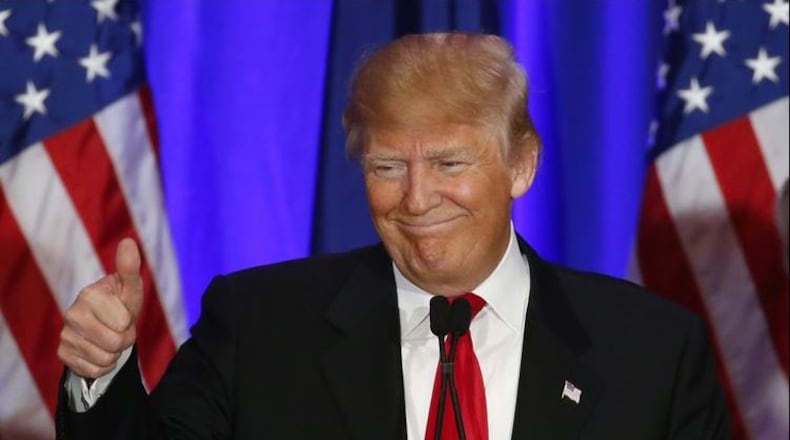A few thoughts about how the GOP race is taking shape now that South Carolina's results are in .
1. Donald Trump is the clear leader. But he is a weak front-runner relative to past Republican contests. In the past, by the time South Carolina voted there was almost always a candidate who'd hit 40 percent in at least one of the first three contests; the only exception was in 2008, when the best finish at this stage of the race was John McCain's 37 percent in New Hampshire. So far in 2016, the best showing by a candidate is Trump's 35 percent in New Hampshire. That points to a more fractured field than we've usually seen, even compared to past elections when the field was large.
The question to be asked now is whether Trump has hit a ceiling of around one-third of the GOP electorate. If he has, and supporters of other candidates consolidate behind alternatives to Trump, then he stands to lose as the field narrows. Indeed, an NBC News/Wall Street Journal national poll this past week showed Trump would lose handily to either Ted Cruz (56-40) or Marco Rubio (57-41) in a one-on-one match-up. What we don't know is how quickly the race can get to two candidates. Speaking of which ...
2. One big step toward a narrower field came Saturday night, when Jeb Bush did the best thing he could do at this point to stop Trump : He announced the suspension of his campaign. Bush was an accomplished, conservative governor in Florida and brought probably the biggest policy heft to this race. But that wasn't enough, by a long shot. A distant fourth-place finish in South Carolina was the final straw for the former presumed front-runner, who spent nearly $100 million to win four delegates. Dropping out means his supporters -- including his financial benefactors -- can turn to other candidates. The likelihood they'll go to Trump is smaller than tiny. But the likelihood they'll go mostly to one other candidate isn't much better. The effect of his dropping out will be muted unless the field shrinks further ...
3. John Kasich declared the election to be a four-man race after South Carolina. But it's unclear why he thinks he's really still a factor. He got 1.9 percent in Iowa, 15.8 percent in New Hampshire and an estimated 7.6 percent in South Carolina. The fact that his number in New Hampshire was good enough for second is less impressive than the fact that both Cruz and Rubio have twice cleared the 20-percent threshold in a state (Iowa and South Carolina). In those two states, which are more representative of the GOP primary electorate, there was in fact a clear top tier of three candidates, and then a group of also-rans. Kasich wasn't in that top tier either time; his claim to viability at this point is just being at the top of a second-tier muddle in New Hampshire. I'd be shocked if he were to drop out before the "SEC Primary" on March 1, but he ought to think long and hard about whether he'd be better off holding out until his home state of Ohio, winning there and seeing if that translates into anything, or trying to help one of the other candidates win the Buckeye State.
The only other candidate in the race, Ben Carson, said Saturday night he intends to fight on. I saw some speculation his resolve won't last past Tuesday's caucus in Nevada. If it does, it will be hard to chalk that up to anything but stubborn pride -- for a man whose main appeal to voters has been his grace and humility. He ought to think about whether that's the impression he wants to leave at the end of this campaign, because he is well past the point of having a realistic chance to win anything.
4. That leaves Cruz and Rubio. Of the two, Rubio's path forward is far clearer.
Cruz appears to have staked his campaign in large part on two things: winning evangelicals, and winning converts from Trump. In South Carolina, he accomplished neither. Exit polls showed Trump won among evangelical or born-again Christians, with 33 percent to Cruz's 27 percent. And with the results he's getting, Trump obviously isn't getting out of the race anytime soon. This was the first time in three states that Cruz's result has been a disappointment, but it's hard to see where Cruz will get the voters he needs to get past Trump. Maybe from Rubio, if Trump goes on the offensive against the Floridian. But that depends on whether Rubio supporters see enough of a distinction between Trump and Cruz; the ones with whom I speak in Georgia, anyway, tend not to.
Rubio's path forward is clear, if hardly a sure thing. He needs to have Kasich and Carson join Bush in dropping out, and consolidate the so-called "establishment lane" against the other two. Then he needs Trump to push Cruz out of the race, at which point it's a two-man race and he takes his best shot.
5. The key to all this is timing. The longer it's a race among more than three (and really more than two) people, the better it is for Trump. The sooner the field narrows, the better the odds of the not-Trumps. It's pretty much that simple.
About the Author
The Latest
Featured



